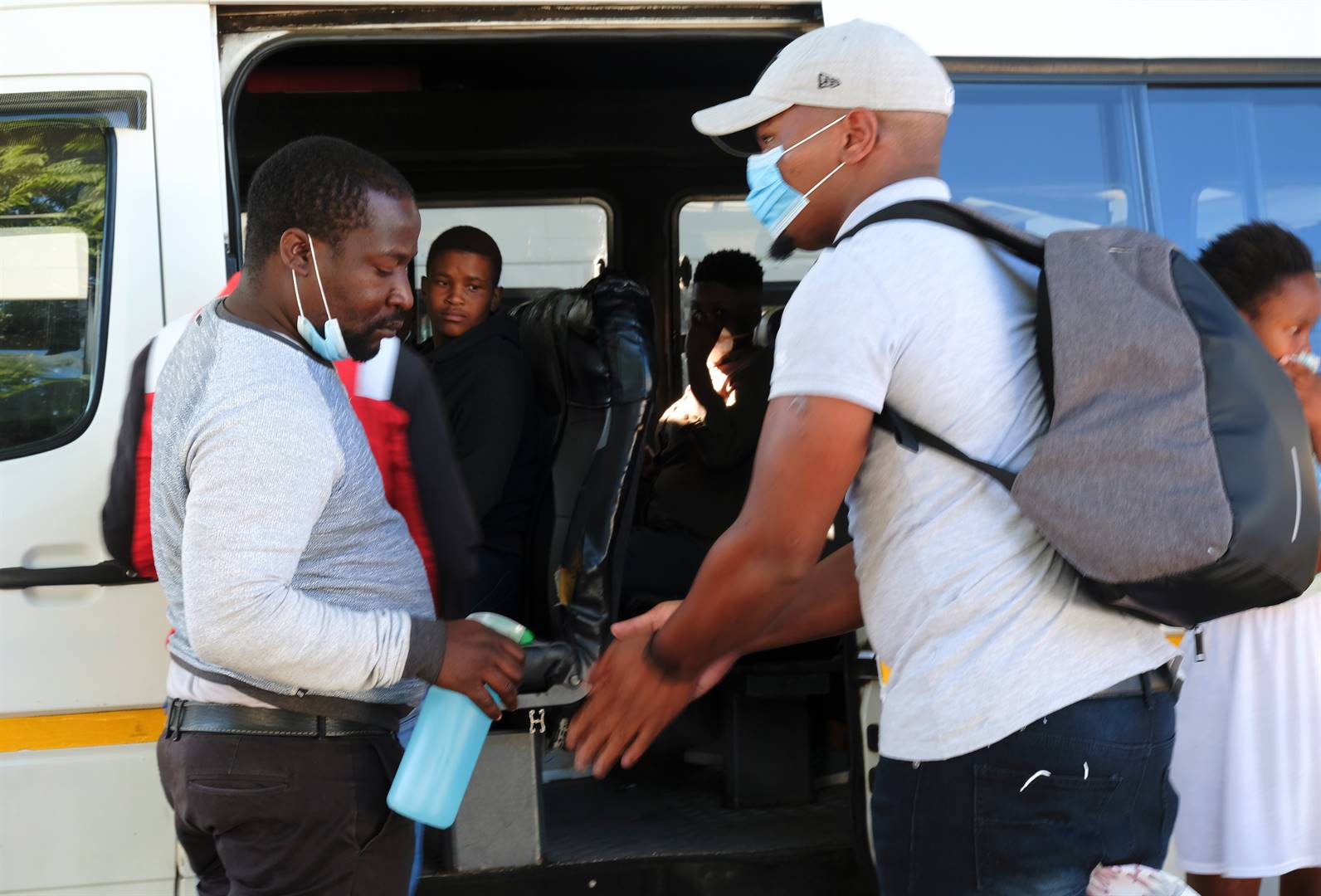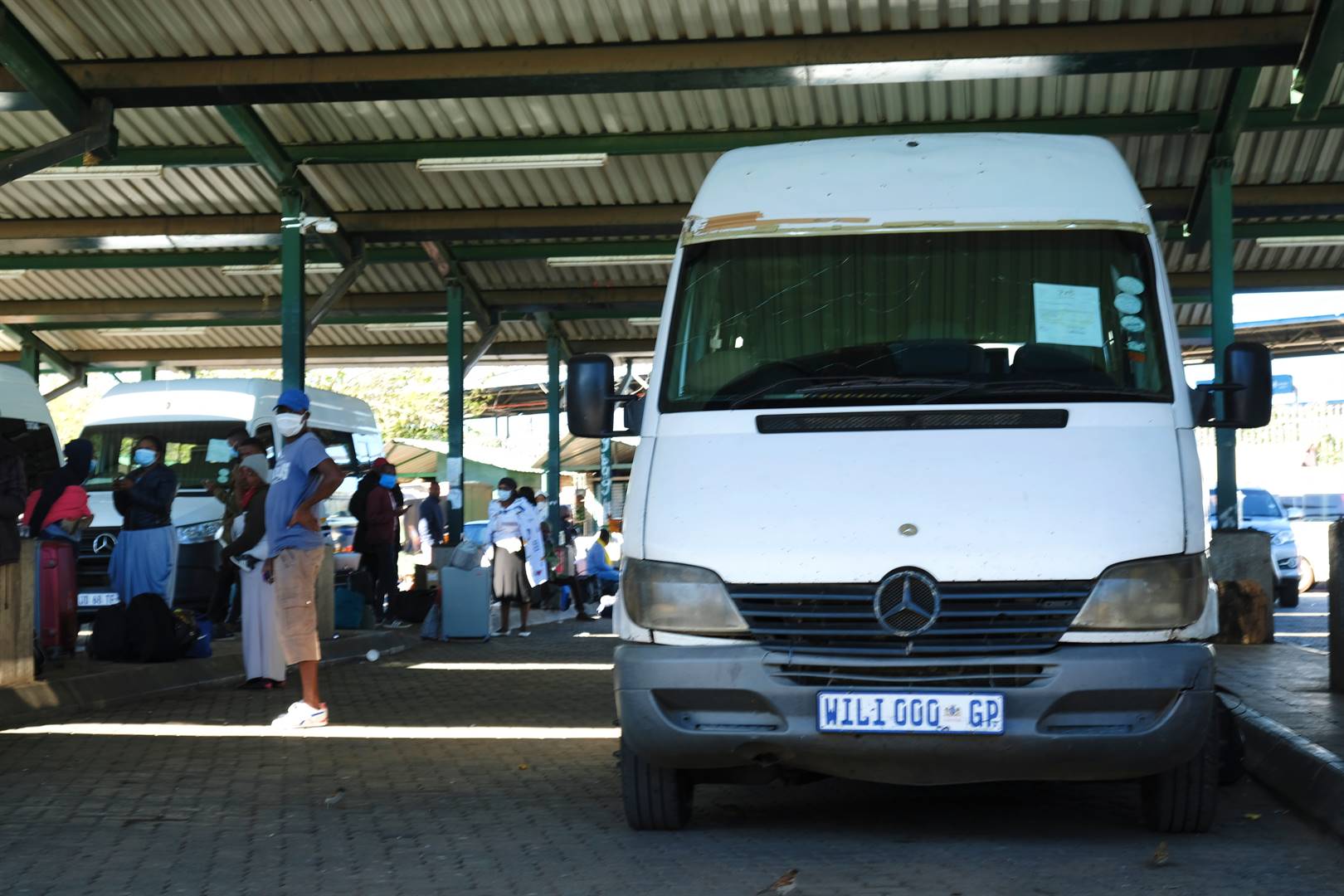
The vast majority of people in South Africa depend on public transport, which poses a heightened risk for contracting the Covid-19 coronavirus. Practical health measures and various fascinating innovations could not only mitigate this, but change how we travel long-term.
A few dozen people wearing home-made and medical masks sit waiting for taxis as drivers spray hand sanitiser on commuters and tell them where inside of the ubiquitous Toyota Quantum minibus taxi they may sit to keep the appropriate distance.
The scene on this Friday morning is eerily quiet for Bosman Taxi Rank, usually one of Pretoria’s busiest and loudest spots.
“The mood is very sombre”, says MacDonald Makata, public relations officer of the SA National Taxi Council in Tshwane.
Only about a fifth of the rank is operating, with vehicles filled to a maximum of 70%, sanitised regularly and deep cleaned twice a week.
Charles, who has been a taxi driver for about five years, says all commuters are meant to wear masks, although only about half do.
“It’s very difficult ... but we have to follow,” he says of the regulations.
Makata agrees that while the health measures are important, they are not easy to implement.
“In a way, it is helping to flatten the curve,” he says, “but pocket-wise it is not helpful at all.”
Similar health and safety regulations are in place across the board in the different modes of private and public transport that is allowed during level 4 of the lockdown, with some buses and the Gautrain slowly resuming operations.
Read: Taxis get more time while trains remain off-limit
Transport ministry spokesperson Ayanda-Allie Paine says they are testing the state of readiness and the viability of instituting the health measures at scale before reopening the Metrorail system in either level 3 or level 2.
While the ministry is exploring a variety of future scenarios, Paine says the economy and budgets will have to be considered, “so one is fearful of saying that this is what we’ll do and for how long and whether or not it will be sustainable”.
The risk
Despite the practical implementation being challenging, the need for health measures in public transport is undeniable.
Professor Taryn Young, the head of the department of global health and the director of the Centre for Evidence-based Health Care at Stellenbosch University, and a team recently conducted a rapid review of research linking public transport and viral respiratory infections such as influenza.
She says, in simple terms, “the risk of transmission within public transport comes from the fact that it is large numbers of people who will be very close to each other”.
The studies confirmed that using public transport significantly increased the chances of contracting influenza. This risk is based on factors such as the proximity of commuters, the time spent travelling, and the inadequate ventilation in these spaces.
Young notes that this may especially relate to people who are infected but not yet tested or showing symptoms. She says another risk factor is that public transport, particularly over longer distances, can bring viral infections into new areas.
The common interventions to mitigate this risk fall into four broad categories, namely environmental controls, respiratory etiquette, hand hygiene and mask usage. Young reminds that “it’s about a combination of strategies, it’s not just about doing one of these”. Encouragingly, these areas are already being addressed or planned for in South Africa.
Environmental controls
Hand sanitisers and deep cleaning seem to already be widely in place and Gauteng MEC for Public Transport and Roads Infrastructure Jacob Mamabolo is launching a provincial taxi disinfection programme aimed at increasing compliance with regulations.
Sanitisation or health screening booths, such as the ones recently installed by the Gautrain, are another option that is being considered by the ministry for larger-scale roll out. Paine says these may be used more widely because “they not only check your temperature, but they also spray with sanitisers that stay on your clothes and body for an hour while you’re commuting”.
She says the ministry is also considering cashless systems in taxis as a way of increasing hygiene.
“We are not there yet, but these discussions have already begun.”
Responding to Spotlight about larger changes in the system, Transport Minister Fikile Mbalula says that: “Yes, structural innovation must be the new thing”.
He emphasises that the chosen changes must be value for money. Mbalula uses the example of the sanitisation booths as something that can be implemented in larger transport spaces such as the rail network.
“It is innovative; it is highly convenient; it is proper. That is what we want to see,” he says.
Read: Relief fund on the cards for taxi industry
Commuting in a Covid-19 world
Researchers and officials can test and implement strategies that not only bring down health risks but might improve the system overall, including making it less crowded, more streamlined and possibly even addressing some of its financial challenges.
But the public transport system in South Africa is a large, multifaceted beast. Adapting to the longer-term risk of Covid-19 will require complex solutions, political will and careful negotiations.
In the meantime, for the drivers spraying hand sanitiser at Bosman and ranks like it around the country, changes are possible but difficult.
Charles says that even though some commuters have trouble complying, “we as people; if we can follow the rules, we can win this”.
This article was produced by Spotlight, an online publication monitoring South Africa’s response to TB and HIV




 Publications
Publications
 Partners
Partners










